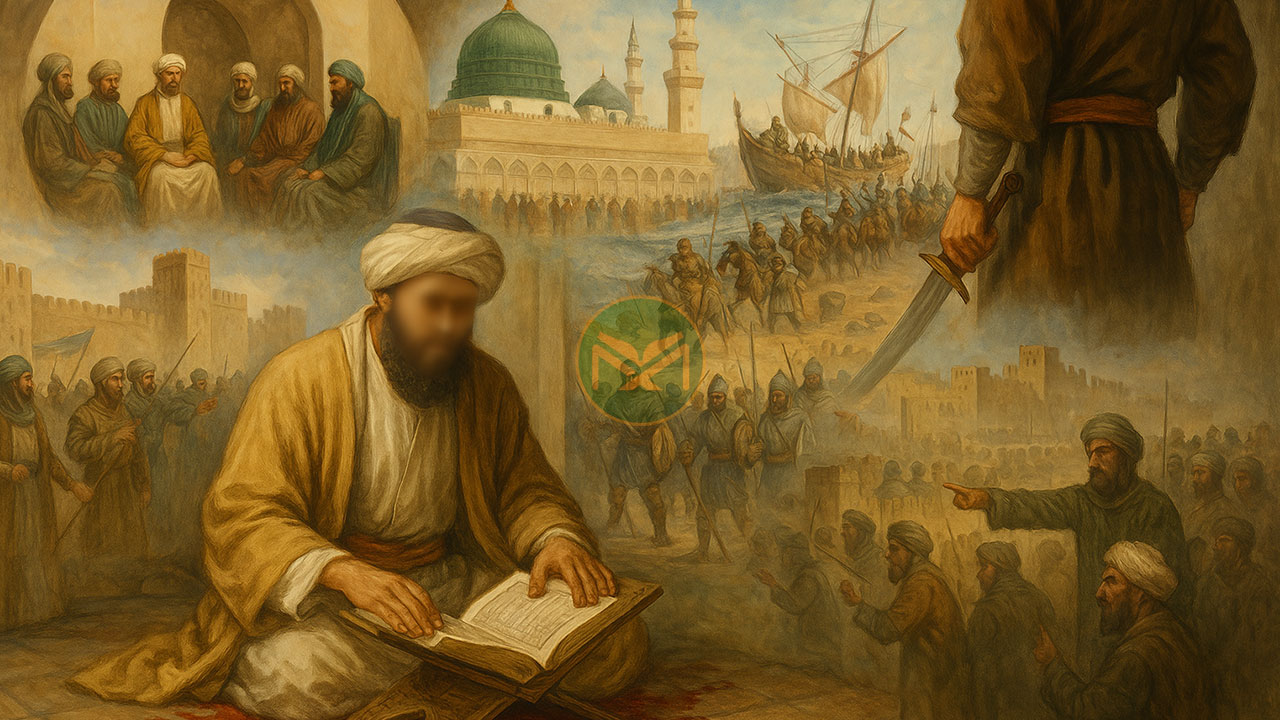Uthman ibn Affan's Life Stories and His Assassination

The caliphate of Uthman ibn Affan (may Allah be pleased with him) is considered one of the longest and most eventful periods of the Rightly Guided Caliphs.
His era witnessed massive territorial expansions, economic prosperity, and monumental achievements such as the unification of the Quran. However, the later years of his reign were marked by internal strife and political turmoil, culminating in his tragic martyrdom while reading the Quran in his own home.
His Appointment as Caliph
After the martyrdom of Umar ibn Al-Khattab (RA), the six-member council (shura) designated by Umar convened to choose the next caliph. The members included Ali, Abdul Rahman ibn Awf, Zubair, Sa’d, Talha, and Uthman.
Abdul Rahman ibn Awf consulted the broader community, and the majority favored Uthman for his piety, modesty, and leadership. He was appointed caliph in Muharram, 24 AH.
Achievements During His Caliphate
1. Compilation of the Qur’an
Uthman commissioned a standardized version of the Quran due to emerging differences in recitation. He appointed Zayd ibn Thabit and others to compile it in the Quraysh dialect, then sent copies to all provinces.
“O Commander of the Believers, rescue this Ummah before they differ over the Book like the Jews and Christians”. – Hudhayfah ibn Al-Yaman
2. Military and Naval Expansion
The Islamic empire expanded to Armenia, Khurasan, Nubia, and North Africa. He also established the first Islamic naval fleet with Muawiyah ibn Abi Sufyan, which led to victory in the Battle of the Masts against the Byzantines.
3. Expansion of Al-Masjid an-Nabawi
Uthman funded a major expansion of the Prophet’s Mosque and had previously purchased Bir Rumah as a charitable endowment for Muslims.
His Character and Virtues
- Modesty – “Shall I not feel shy before a man whom even the angels are shy of?” – Prophet Muhammad ﷺ
- Generosity – He financed the entire Army of Tabuk
- Humility and Piety – He lived simply despite his wealth
He was described as tall, fair-skinned, with a thick beard and handsome appearance.
The Beginning of the Sedition (Fitnah)
The final years of Uthman’s reign were marred by political unrest fueled by:
- Jealousy and political ambition from certain factions
- Abdullah ibn Saba, a deceptive figure who incited rebellion
- Propaganda and slander about Uthman’s governors and policies
Despite threats, Uthman refused to use force against Muslims, choosing peace over bloodshed.
Who Killed Uthman?
Abdullah ibn Saba played a major role in inciting rebellion under the guise of supporting Ali (RA). Delegations from Egypt, Kufa, and Basra surrounded Uthman’s house and demanded he step down. Despite offers from companions to defend him, he refused to shed Muslim blood.
"I would not meet my Lord with the blood of a single Muslim on my hands." – Uthman ibn Affan
The Martyrdom of Uthman
After over 40 days of siege, the rebels stormed his house on 18 Dhul-Hijjah, 35 AH. He was fasting and reading the Quran when they struck him with a sword. His blood spilled onto the page he was reading:
“So Allah will suffice you against them. And He is the Hearing, the Knowing”. (Surah Al-Baqarah: 137)
Names of His Assassins:
- Al-Ghafiqi ibn Harb
- Kinana ibn Bishr
- Sawdan ibn Hamran
- Abdullah ibn Saba (as the main instigator)
Consequences of His Assassination
- The unity of the Ummah was shaken
- The First Civil War (Fitnah) began
- The era of political turmoil among the companions started
Conclusion
The caliphate of Uthman ibn Affan (RA) was an era of unparalleled achievement and spiritual leadership. His life was filled with devotion, sacrifice, and sincerity. His patience during the fitnah and refusal to fight fellow Muslims remains one of the most powerful lessons in Islamic history. May Allah be pleased with him and reward him with the highest ranks in Paradise.